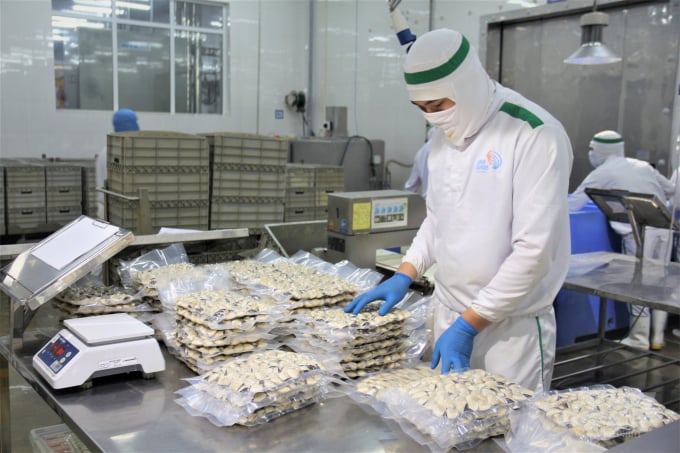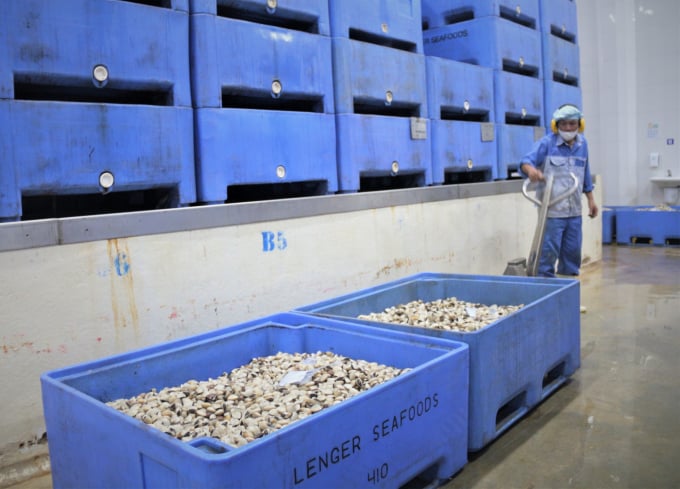November 28, 2025 | 01:48 GMT +7
November 28, 2025 | 01:48 GMT +7
Hotline: 0913.378.918
November 28, 2025 | 01:48 GMT +7
Hotline: 0913.378.918

Mollusks is among five aquaculture products for export of Vietnam with the yearly export value of about US$659 million. Photo: Pham Hieu.
According to the Department for Agricultural Products Processing and Market Development under the ministry, mollusks including clams, scallops, oysters and mussels are among five key agriculture products for export of Vietnam with export revenue of about US$ 659 million.
At present, coastal provinces in Hong ( Red) River Delta are major mollusks producing and processing areas in Vietnam with a total mollusks farming area reaching about 41,000 ha.
For recent years, the agriculture ministry has paid attention to develop close value chains for mollusks so that the Vietnamese products could better meet requirements and standards of importers around the world including China, EU and US.
Despite the negative impacts of COVID-19 pandemic, the European market, particularly Spain and the Netherlands last year imported many mollusks products from Vietnam as the Europe-Vietnam Free Trade Agreement (EVFTA) took effects in 2020.
Quốc Toản, director-general of the General Department for Agricultural Products Processing and Market Development told Vietnam Agriculture newspaper that demand for mollusks in potential markets was likely to increase in coming time.
“It’s time for us to improve legal framework so that mollusks production could be organised systematically and more reasonably,” he said.
A master plan for mollusks industry was needed, Toan said, emphasizing the need to develop close value chains, traceability and even Geographical Indication (GI) for mollusks to make Vietnamese products better meet requirements of demanding importers.
It was also necessary for Vietnam’s mollusks industry to develop strong brandings with closed modern processing complex, Toan said.

Close value chains and product traceability are among key factors for Vietnam’s mollusks industry develop sustainably and further integrate into the global stage. Photo: Pham Hieu.
“The linkage between household farms and importers should be tightened, so that not only FDI enterprises, big producers but also farmers could have a better market understanding,” Toan said, adding that better market understanding would help farmers improve their livelihood and turn prosperous with mollusks.
Compared with other countries in the world and Asia, Vietnam was quite good at aquaculture product processing but mollusks group was very typical.
“It’s time to develop processing complex to engage household farmers as satellites,” he said.
“To develop the mollusks industry sustainably, it’s a must to have a stable raw material zone, technological applications, expanded markets and improved capacity for mollusks farmers,” Toan said.
A bottle-neck in agricultural production now in Vietnam was the connection between processing complexes and material zones.
It was necessary to expand cultivation areas or increase productivity thanks to sciences and technologies, planning and market forecasting.
There were three main problems for Vietnam to solve, Toan said.
Firstly, it was about the harmony between raw material zones and market demand. Secondly, it was needed to identify the processing areas. The third problem related to the labour force in localities and labour in agriculture.
Thus, localities played an important role in organising and developing agriculture production.
To mollusks industry, besides the issue of raw material areas, processing was a pending problem as now, mollusks were mostly processed and packed simply. Deeper processed products could generate more values./.
Translated by Bich Huong

(VAN) After the institutional merger, Da Nang possesses significant forest-carbon reserves and is proactively engaging in the carbon market, creating a new revenue stream.

(VAN) An Giang strengthens communication against IUU fishing, increases inspections and sanctions, and is determined to remove the EC’s “yellow card” while developing a sustainable fisheries sector.

(VAN) As green transition becomes a global trajectory, Viet Nam’s biggest challenge is not only technology and models, but how to ensure that capital flows reach the right beneficiaries.

(VAN) The Ministry of Agriculture and Environment must spearhead the construction of green governance, spanning decision-making processes and investment standards to policy evaluation mechanisms.

(VAN) The Agriculture and Environment sector of Khanh Hoa has achieved numerous milestones over the past 80 years, contributing significantly to the goal of establishing the province as a centrally governed city by 2030.

(VAN) Viet Nam is entering the pivotal period of 2025-2030, moving toward the formulation of the Remote Sensing Law, which will establish a legal foundation for the development of national digital data.

(VAN) The agricultural sector is finalizing the strategic framework for emission reduction, setting the goal of sharply cutting methane and 403.7 million tons of CO2 equivalent and moving toward Net Zero by 2050.